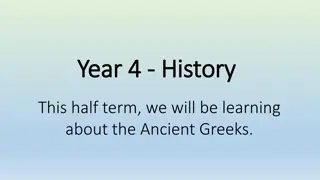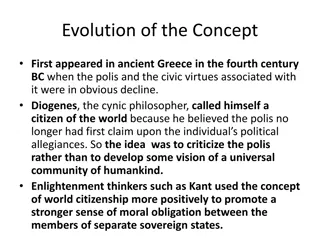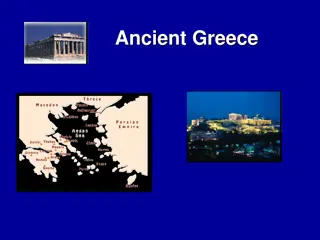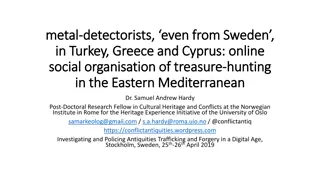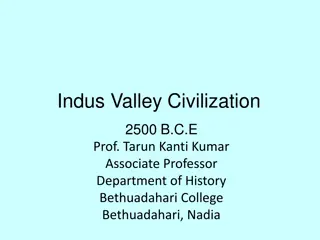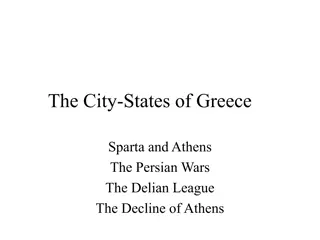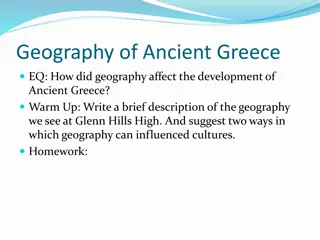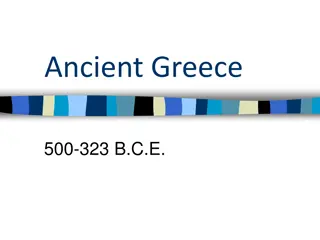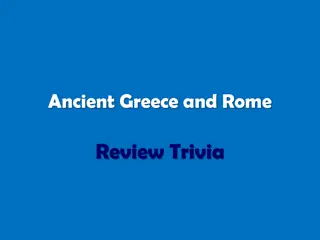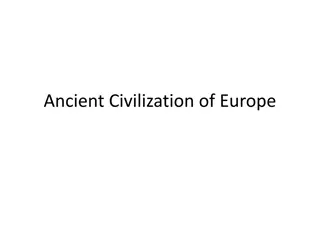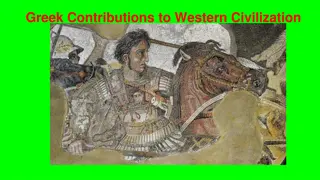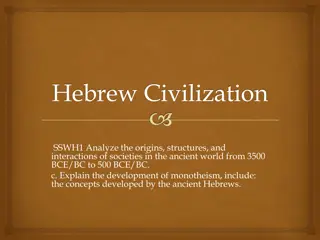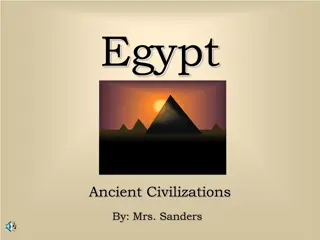Ancient Greece: History and Civilization Overview
The geographical challenges of Ancient Greece led to the development of distinct communities with unique customs and beliefs. The Minoans and Mycenaeans played significant roles early on, but the Dark Ages followed the collapse of civilization post-Trojan War. Different forms of government emerged, from aristocracy to democracy, with Athens reaching its Golden Age under Pericles. Meanwhile, Sparta stood out for its harsh and disciplined way of life.
Download Presentation

Please find below an Image/Link to download the presentation.
The content on the website is provided AS IS for your information and personal use only. It may not be sold, licensed, or shared on other websites without obtaining consent from the author. Download presentation by click this link. If you encounter any issues during the download, it is possible that the publisher has removed the file from their server.
E N D
Presentation Transcript
ANCIENT GREECE Unit 3
GREECE The geography of Greece made it very difficult for different communities to get together Greece is a country made up of Peninsulas and mountains are the major landform. Each community developed its own customs and beliefs. Each believed in its own land, traditions, and way of life were the best. Two ancient peoples, the Minoans and the Mycenaeans made an important impact on Greek History. Minoans Mycenaeans Island of Crete Broad sea trade Had writing Had writing Controlled the Aegean sea and parts of the Mediterranean.
DARK AGES OF GREECE Not long after the Trojan War, civilization in Greece collapsed. Poverty was everywhere People no longer traded for food and other goods beyond Greece Depended on what they could raise and manage themselves Many Greeks forgot the art of writing because they were so concerned with survival Called Greece s Dark Ages because without writing, people had to go by word of mouth to keep their history and traditions alive. Many people did learn to farm and moved to more agriculturally rich areas.
GOVERNMENT IN GREECE Aristocracy Most city-states of Greece were ruled my aristocrats. Aristocrats controlled most of the good land. They could also afford horses, chariots, and the best weapons to make themselves stronger Aristocratic governments were often overthrown by TYRANTS. A ruler who seizes power by force Usually supported by the middle and working class Democracy Many city-states overthrew Tyrants and developed a system where they govern themselves Athens was the most developed Democracy in Ancient Greece Solon was the first democratic leader in Athens He won the power to reform laws and he reformed both the economy and the government of Athens.
GOLDEN AGE OF ATHENS Time period of 479 B.C. to 431 B.C. is known as the Golden Age for Athens Athens grew rich from trade and from silver Made important achievements in the arts, philosophy, an literature. This is when democracy reached its high point under Pericles. Made it so that poor citizens could afford to hold public office. Oversaw the construction of the Parthenon (a temple to the Goddess Athena).
SPARTA Sparta was a city-state in southern Greece Life in Sparta was harsh and cruel Spartans were tough, silent, and Grim. Early in their history, the Spartans conquered land all around their city and turned conquered people into slaves (Helots). Helots did all the farm work. They were treated very harshly
GROWING UP IN SPARTA The life of every Spartan was in the hands of the gov t from birth. Only the healthiest children were raised because the Spartans wanted only the healthiest people in their city Growing up MALE in Sparta Growing up FEMALE in Sparta Training to be a soldier started at age 7. Boys left their home to live in barracks with other boys Training continued for the next 13 years Urgedto steal Expected to bear pain, hardship, and punishment in silence When he became 20, a young man officially became a soldier Girls also trained and competed in wrestling and spear throwing. They were allowed to own land and even take part in business (better than other Greek city-states). Had to obey Males Many ran their farms and estates since the mans job was always military matters.
PELOPONNESIAN WAR The Peloponnesian War was a conflict between Sparta and Athens that lasted for 27 years. Many city-states began to resent Athens power They looked to Sparta to protect them Between a plague that struck Athens, and the Spartan blockade of Athens, the Spartans rang victorious.
ALEXANDER THE GREAT Alexander the Great was the Macedonian King who had conquered Persia, Egypt, and lands extending beyond the Indus River in the east. Came to power when his dad, Philip , was assassinated. Wherever Alexander went and conquered, he built cities. Died young. Known as the greatest leader Greece had ever seen.
GREEK CULTURE SPREADS Just as Alexander had spread Greek culture, so did his successors. Hellenistic culture (describing the time in ancient Greek after ATG) continued to spread Greek values. They hoped that the Greek culture would mix with that of conquered lands to make new cultures with Greek influence
COMPREHENSION QUESTIONS On a separate sheet of paper, answer questions from Chapter 7, sections 2 and 3 On page 213, answer questions 1B, 2A, and 3A On page 222, answer questions 2A, 2B All answers must be in COMPLETE SENTENCES. Answer as if the reader does not know the question. Turn the question around in your answer!




